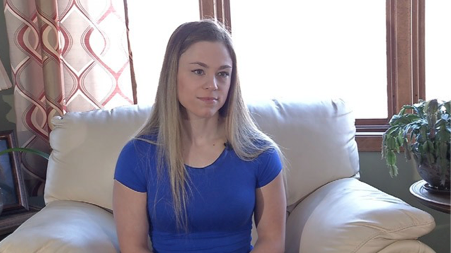Megan is a member of World Class Athletes, the army’s elite team of soldier8athletes, and competes in skeleton, a form of high8speed downhill sledding. In Utah, training for the 2014 Olympic Games in Russia, she found herself gasping for breath.
Ten days earlier, Megan had started using NuvaRing, her first experience with birth control. “Do you smoke?” a doctor asked her. “Of course not, I’m an athlete,” she said. “Oh well, you should be fine,” the doctor said. In perfect health up to then, Megan could not stop fighting for air. Her teammates blamed the altitude. “One doctor I went to told me I was under stress, or maybe I had asthma,” she told me. “He gave me an inhaler.” On a flight to Florida for more training, she almost collapsed. “At Urgent Care, I was given an X8ray—it was clear. I said, ‘Could this be the NuvaRing?’ ‘Absolutely not,’ the doctor said.”
Megan’s mother told her to come home “Megan, you need to come home to get you an appointment with a pulmonologist.” After a second flight—she later learned that that alone could have killed her—Megan told her history to a Connecticut pulmonary doctor, who ordered a CT scan. That doctor diagnosed her with pulmonary embolism and told her it was from the birth control device.
The CT scan revealed dozens of blood clots in her lungs. “It looks like if you took paint and splattered it like that, there were just blood clots everywhere.”
Rushed to the hospital, I was put on blood thinners in the E.R., and remained hospitalized for over a week. I was told, ‘Your career as an athlete is over,’ and “If you weren’t in the shape you are, you would be dead,” her doctor informed her.
That’s when she found out her Olympic dreams had been dashed. She had to miss a year of training, and that there was long term damage.
“If I were to have a family,” said Henry, “I’m a high risk pregnancy. The danger of me having blood clots and even the fetus is there, and that’s kind of scary to think about.”
“I’m extremely fit,” she said. “I eat well, healthy. It did not cause me any alarm whatsoever.”
While she missed an opportunity to compete in the Sochi games, she said she plans on fighting for a spot on the 2018 team that will compete in Pyeongchang, South Korea.
Until then, she’ll fight on behalf of women she said need to know why she was forced out of the race.
“I had to be very persistent,” said Henry. “I had to see five doctors, and if I listened to the first one I may not be here to tell my story.”

